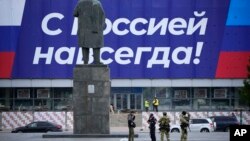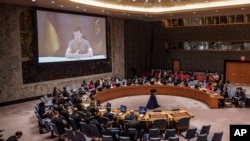European Union officials called Wednesday for “biting sanctions” on Russian trade, assailing Moscow for the “sham referendums” it staged in Ukraine as a pretense for an illegal land grab to change the border with its neighbor.
European Commission President Ursula von der Leyen said the Kremlin-orchestrated referendums in four Ukrainian regions to join Russia "are an illegal attempt to grab land and change international borders by force."
Russia says the outcome of the balloting over the last five days heavily favors annexation but the referendums are being uniformly rejected by Ukraine, the U.S. and its Western allies.
Von der Leyen said the EU is planning "sweeping new import bans on Russian products" and to expand its export ban "to deprive the Kremlin's military complex of key technologies."
"This will keep Russian products out of the European market and deprive Russia of an additional 7 billion euros in revenue," von der Leyen told reporters in Brussels. The EU’s 27 member countries would have to approve the sanctions for them to take effect and the bloc has had difficulty in reaching agreement on some previous sanctions.
“We are determined to make the Kremlin pay for this further escalation,” she said. Russia could annex the Ukrainian territory—about 15% of the country—in the coming days and then claim that any attempt by Kyiv’s forces to retake it would be an attack on Russia itself.
EU foreign policy chief Josep Borrell urged the international community to not recognize the referendums.
"With the illegal referenda organized by Russia, the Kremlin is following the same playbook that we have already seen” in Crimea in 2014, Borrell said in a statement, referring to an earlier Moscow-sanctioned vote after it seized the Ukrainian peninsula as a violation of international law and the principles of the United Nations charter.
Borrell said asset freezes and European travel bans would be imposed on the "proxy Russian authorities" in the Donetsk, Kherson, Luhansk and Zaporizhzhia regions where the referendums were held.
Officials in the four regions said Wednesday that they would ask Russian President Vladimir Putin to incorporate their provinces into Russia.
Russia-installed officials said 93% of ballots cast during the five days of voting in Zaporizhzhia supported annexation, along with 87% in Kherson, 98% in Luhansk and 99% in Donetsk.
Ukraine urged its backers Wednesday to make clear to Russia that "its attempts of annexation, blackmail and ultimatums" will only bring more support to the Ukrainian side in the conflict that began with the February invasion of Ukraine by Russian forces.
"Ukraine calls on the EU, NATO and the Group of Seven to immediately and significantly increase pressure on Russia, including by imposing new tough sanctions, and significantly increase their military aid to Ukraine, including by providing us with tanks, combat aircraft, armored vehicles, long-range artillery, anti-aircraft and missile defense equipment," the Ukrainian foreign ministry said in a statement.
Ukrainian President Volodymyr Zelenskyy told the U.N. Security Council on Tuesday that Russia must be isolated internationally for the sham referendums.
"There is only one way to stop this all," he said by video. "First, it is the complete isolation of Russia in response to everything it does."
If Moscow annexes these territories, Zelenskyy said, it "will mean that there is nothing to talk about with the president of Russia."
Diplomatic action
The United States and Albania have circulated a draft resolution to Security Council members condemning the referendums, calling on countries not to recognize any altered status of Ukraine and compelling Russia to withdraw its troops from the country.
"If Russia chooses to shield itself from accountability here in the council, we will then look to the U.N. General Assembly to send an unmistakable message to Moscow," U.S. Ambassador Linda Thomas-Greenfield said. "The world must stand together and defend the Charter of the United Nations."
She told reporters after the meeting that she hopes to seek a vote in the Security Council either late this week or early next week.
Some information for this story came from The Associated Press, Agence France-Presse and Reuters.








